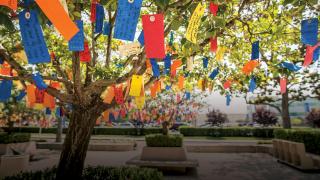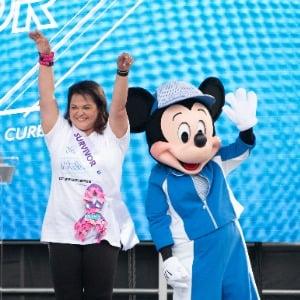Diagnosed with an aggressive form of breast cancer in 2008 at only 33 years old, Maria Flores sought treatment at City of Hope. In the years since winning that battle, she has stayed active in the life of the institution — advocating for patients, counseling the newly diagnosed and promoting funding for cancer research.
There’s a cabinet on prominent display in her home with mementos of her cancer journey and what followed. Among them is a ribbon she made the first year she took part in City of Hope’s annual Walk for Hope, which raises funds for the fight against women’s cancers. Dozens of charms are attached, each one with the name of a woman she knows who has faced cancer.
“When I look at it, it makes me smile because a lot of these women are still here,” said Flores, a paralegal and office manager who lives in West Los Angeles. “But it makes me sad that every year I keep adding to it. That’s why I do it — I really hope I’m adding fewer and fewer names in the years to come.”
Flores, 46, shares her story as she looks forward to bearing the standard of hope for patients like her as a part of City of Hope’s delegation at the 2022 Rose Parade.
What were your main concerns when you were first diagnosed?
I was 33. It’s a time in your life where you’re past the “I know it all” phase, and you hit, “Let me figure out what I really want to do with my life.” To have the diagnosis at that moment in time — my heart still beats a little fast. It’s like hitting the brakes very suddenly. Your plans for what was going to happen in the next five years, 10 years — they don’t matter anymore.
I have a very close-knit family, so aside from how it affected me, to see them go through it still brings tears to my eyes. How do you stay strong for not only yourself but also everyone else?
What did your family mean to you during that period?
I couldn’t even fathom getting through six months of chemo and numerous surgeries without them. Luckily for me, I didn’t even have to think about it. They were there. They were coming with me whether I wanted them to or not.
You opted to undergo preventive surgeries, removing your breast that was unaffected by cancer and later your ovaries. What went into those decisions?
My family history is full of different cancers. Then I found out that my cancer was triple-negative and I carry the BRCA gene. Since I was diagnosed, I’ve lost five aunts on my dad’s side to breast and ovarian cancers, women who battled for a very long time.
The surgeries were tough decisions. Since my early teens, I was one of those people who didn’t want kids. But not having the choice anymore is almost as bad as hearing you have cancer all over again.
I still battle with it now. But ultimately, I made the best decisions I could, given the circumstances. I try not to beat myself up. These decisions have allowed me to still be here now.
What motivated you to participate in clinical trials?
At first it was scary, because I didn’t know whether the drugs would work or not. But I was definitely all for helping other patients.
In order for me to benefit, someone else had to go through the current treatments when they were offered through clinical trials. You have to pay it forward. If we don’t volunteer for these clinical trials, there’s no progress. I see the commercials on TV now for some of the drugs I received through those studies.
What drives you in your work with City of Hope’s Patient and Family Advisory Council?
City of Hope saved my life, so how can I possibly not be involved? To me, that just wasn’t even an option. It’s been an amazing adventure. We’re part of research, the construction, the expansion, all of the things that are making it bigger and better for our patients.
How has your experience changed your perspective on life?
I’ve learned to find a better balance in life, because I almost lost the opportunity to do so. I take better care of my relationships with family, with friends, with people I meet in general. I’m more forgiving and accepting of others.
It’s also given me the desire to go out and explore. I never used to take vacations. A couple of years before Covid, I took the trip of a lifetime — 27 days in Italy. It really expanded my knowledge of the culture.
Do you have any words of advice for those who might be going through something like what you went through?
Don’t be afraid to ask questions, to become more informed, to be part of your treatment plan. A lot of times, people don’t want to question anything. So many decisions get taken away from you with a cancer diagnosis; where you can take power back in any way, that’s a win.

